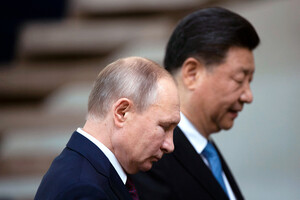Moscow is losing economic and financial influence to countries in Central Asia, which are rapidly receding into Chinese orbit.

History teaches that wars usually have unpredictable consequences and various side effects far from the battlefield. For example, the US Civil War proved fateful for Central Asia. Russia has tightened control over the region to supply it with cotton that has stopped flowing from the slave-owning states of the United States. Of Ukraine , writes Bloomberg. Deteriorating Russia's economic prospects could leave millions of Central Asians unemployed, undermining powerful cash flows to their home countries. But the problems of these people can do even more damage to Russia itself.
Kazakhstan and Turkmenistan receive large revenues from the sale of energy. But their neighbors – Uzbekistan, Tajikistan and Kyrgyzstan – cannot provide enough jobs for their citizens. So they are looking for opportunities to earn money abroad. Last year, there were 8 million labor migrants from these three countries. In 2021, remittances accounted for 34% of Tajikistan's GDP, compared to 33% in Kyrgyzstan, according to the World Bank. In Uzbekistan in 2020, workers' money accounted for slightly less than 12% of GDP. Sanctions against Russia imposed by the United States, the European Union and other countries around the world will undermine these critical payments for Central Asia. And while Putin is waging his unjustified war, the undermining of trade will further damage the region.
Read also: NYT: The war in Ukraine will surprise many, especially Putin
Bloomberg admits that the war against Ukraine could sever Russia's ties with Central Asia forever. Much evidence already indicates that supply chains in the region are already beginning to shift to China and Turkey. Financial ties with Moscow are also weakening. Kazakhstan's Sberbank reported this month that its debt portfolio had shrunk by $ 1.7 billion in April. And this is after Sberbank, as well as Alfa-Bank and VTB lost $ 4.5 billion in deposits in February and March.
The consequences of the war for Russia's economic relations with Central Asia could potentially accelerate the region's full transition to China's orbit. Although this trend became very noticeable in December. As Moscow plunges into a war of attrition against Ukraine's fierce defenders, China is celebrating three decades of relations with independent Central Asian countries. Chinese Foreign Minister Wang Yi visited Kazakhstan this week to meet with colleagues from four other countries in the region. The arrival of the Chinese diplomat laid the groundwork for the visit of Chinese leader Xi Jinping, which will take place in the fall. It will be a major diplomatic and geopolitical statement, given that the Chinese leader has avoided G20 meetings since the start of the COVID-19 pandemic. However, the influx of workers back to Central Asia could provoke socio-economic shocks in their home countries.
“The ability to send young unemployed men to work in Russia has given countries in the region an opportunity to reduce tensions. After all, one can hardly expect anything good when the majority of the population is unemployed, “said Catherine Patz, editor of Diplomat.
Read also: Why China does not want Ukraine to defeat Russia
>
Before attacking neighboring Ukraine, Russia showed the world its attention to Central Asia. In particular, she intervened in the situation in Kazakhstan, when protests erupted there last January. But now Putin's defeated army is mired in Ukraine. Just at a time when China's security interests in the region are only growing. During a visit to Kazakhstan in April, Defense Minister Wei Fenghe signaled Beijing's potential readiness to lend a helping hand, noting that China is firmly opposed to any “color revolutions” imposed from outside.
: the war against Ukraine severely undermines Russia's economic and financial relations with Central Asia. And there is a vacuum that China is ready to fill.




